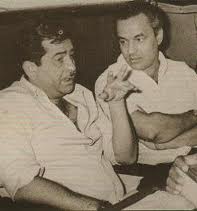


One of my medical college professors - not particularly famous for being nice or diplomatic - had once asked me (who was then occupying the hot seat of the college general secretary!) in exasperated tone, "Why all your orchestra singers are crying only in Mukesh's voice? All other singers are dead or what!"
Voice of Mukesh - Mukeshchandra Zoravchandra Mathur to be more specific - always evoked such extreme reactions. For someone like Salil Choudhury he was a singer capable of stringing together beautiful pearls and for someone like Manna Dey he was nothing more than an amateur singer. To each his own but without a doubt the fact remains that Mukesh was one of the most popular singers of all time.
Born in Delhi on 22nd July 1923, Mukesh left for Bombay soon after finishing matriculation to make it big as an actor. At the tender age of eighteen he made his film debut as a hero against heroine Nalini Jaywant. Rather than his acting prowess a strong recommendation from his relative and the then noted actor Motilal was the catalyst for this opportunity. That film was Ranjit Movietone's "Nirdosh"(1941) in which he also sang his first movie song ‘Dil hi bujha hua ho to fasle bahar kya kare’ under Ashok Ghosh's baton. Neither the movie nor the song made any waves, not even a ripple. His other acting ventures also met with the same doomed fate and he had to take up full time playback singing for survival.
His first singing success came in "Paheli Nazar" (1945). The poignant raag Darbaari strains of ‘Dil jata hai to jalne de’ delivered in an unmistakably Saigal-esqe style made people sit up and take notice of this new singer's tremendous potential. Anil Biswas - the composer of this song - then cautioned him against becoming just another clone of a famous singer and advised him to develop his own style instead.
Anilda's "Anokha pyar" and Naushad's "Mela" and "Andaz" then presented Mukesh in new light as Dilip Kumar's voice and the singer was reborn. His songs like ‘Jhoom jhoom ke naacho aaj’, ‘Tu kahe agar’ and ‘Hum aaj kahin dil kho baithe’ became a rage all over the country. Unfortunately this singer-actor association didn't last long as soon the then superstar switched over first to Talat and then to Rafi as his playbacks and Mukesh was left ruing a golden opportunity. After hearing Mukesh's superb rendition for 'Madhumati''s Dilip Kumar – ‘Suhana safar aur yeh mausan haseen’-recorded almost a decade later - one is left wondering about the changed course of the musical history because of this lost opportunity!

Who could doubt this statement after hearing such gems like the light-hearted philosophical ‘Kisi ki muskurahton pe ho nisaar’, the ever optimistic ‘Haale dil hamara jaane na’, the delightfully naughty ‘Tum kisi aur ko chahogi to mushkil hogi’, the 'spirited' ‘Main nashe mein hoon’ or the heart-tugging ‘Dost dost dost na raha’!
Like Talat, Mukesh also had an inherent sadness in his voice. So songs like ‘Woh tere pyar ka gham’, ‘Saranga teri yaad mein’ or ‘Baharon ne mera chaman lootkar’ sounded even more soulful in his voice. But unlike Talat, he could even belt out light numbers with gay abandon. Songs like ‘Ruk jaa o jaanewali ruk jaa’, ‘Aasman pe hai khuda aur zameen pe hum’ or ‘Bina badra ke bijuriya kaise chamke’ confirmed this time and again.
Many critics derided him as an imperfect singer who had a nasal twang and who would often miss a note or a beat and many a time they had a valid point. His limited vocal range also made high-pitched songs difficult for him. I had once asked the noted composer Kalyanji the secret of Mukesh's singing in spite of his limitations and flaws. The veteran composer with so many Mukesh classics like ‘Mujh ko is raat ki tanhaai mein’, ‘Waqt karta jo wafa’ and ‘Main to ik khwab hoon’ to his credit had replied, " Any thing which comes straight from the heart always touches you. Mukesh's singing was like that. That's why despite its simplicity, straight-forwardness and so-called flaws it always made a great impact." I haven't found a better answer to the Mukesh-enigma yet!
Mukesh himself was not averse to the criticism - in fact he took it in his stride. Often in his live programmes he would jokingly say - "Do you know why Lata Mangeshkar is regarded as the greatest singer? It's only because she has such an out-of-tune singing partner like me!" Still while rendering such breathtakingly beautiful duets like ‘Dil ki nazar se’, ‘Dil tadap tadap ke kah raha hai’, ‘Nain dwar se man mein woh aake’ and ‘Phool tumhein bheja hai khat mein’, he never gave anything less than the best.
Even though the last few years saw him fighting ill health and effects of ageing on his vocals, still he could come up with sublime beauties like ‘Jaane kahan gaye woh din’, ‘Kahin dor jab din dhal jaaye’ and ‘Kabhie kabhie mere dil mein’ with regularity. Not surprisingly his last recording ‘Chanchal sheetal nirmal komal’ was for an RK film "Satyam Shivam Sundaram".
While on a US-Canada concert tour with Lata, he suddenly succumbed to a heart attack. It was just before a concert-show in Detroit. The date was 27th August 1976.
No wonder everyone wanted to sing it like him. Everyone thought they could sing it the way he did. He made it appear so simple - though it wasn't. That was his strength. That was his greatness.
I wish I could have told that to my professor!